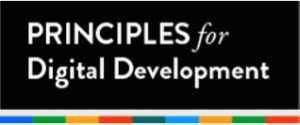 The Principles for Digital Development were developed per the efforts of individuals, international and local development organizations, including non-governmental organizations (NGOs) and nonprofits, and donors who have wanted to improve the use and promotion of information and communication technologies (ICTs) in development projects. The Principles for Digital Development were created in consultation with The Bill and Melinda Gates Foundation, the Omidiyar Foundation, the Swedish International Development Agency (SIDA), the United Nations’ Children’s Fund (UNICEF), the UN Development Program (UNDP), UN Global Pulse, the UN Fund for Population Assistance (UNFPA), the UN High Commission for Refugees (UNHCR), the UN Office for the Coordination of Humanitarian Affairs (OCHA), UN Women, the World Bank, the World Food Program (WFP), the U.S. Agency for International Development (USAID), the U.S. Department of State, and the World Health Organization (WHO).
The Principles for Digital Development were developed per the efforts of individuals, international and local development organizations, including non-governmental organizations (NGOs) and nonprofits, and donors who have wanted to improve the use and promotion of information and communication technologies (ICTs) in development projects. The Principles for Digital Development were created in consultation with The Bill and Melinda Gates Foundation, the Omidiyar Foundation, the Swedish International Development Agency (SIDA), the United Nations’ Children’s Fund (UNICEF), the UN Development Program (UNDP), UN Global Pulse, the UN Fund for Population Assistance (UNFPA), the UN High Commission for Refugees (UNHCR), the UN Office for the Coordination of Humanitarian Affairs (OCHA), UN Women, the World Bank, the World Food Program (WFP), the U.S. Agency for International Development (USAID), the U.S. Department of State, and the World Health Organization (WHO).
For instance, principle 1 is design with the user. The description says, “Too often in the field of international development technology tools are created, or tech-enabled projects are designed, without sufficient input from the stakeholders whose engagement and ownership are critical to long-term success.” The design with the user principle provides recommendations to avoid this.
You can download this one page Principles for Digital Development flyer and post it (for instance, post it in your office for any visitor to see), include it in an information packet, etc.
Tweets about this initiative use the tag #digitalprinciples
The only thing missing? Something very significant: a principle regarding equal access: regarding accessibility for people with disabilities and people using assistive technologies, regarding ensuring that women and girls have full access to ICT resources developed (in a harassment-free, intimidation-free environment), regarding access by minority groups to resources developed, etc.
Also see:
- Women’s Access to Public Internet Access, resources and ideas to support the development of women-only Internet centers/technology centers/etc., or women-only hours at such public Internet access points, in developing and transitional countries, to ensure a harassment-free, intimidation-free environment.
- Archive of the United Nations Information Technology Service (UNITeS) , a global initiative to help bridge the digital divide, one of the first UN initiatives on the subject (maybe the first?). UNITeS both supported volunteers applying information and communications technologies for development (ICT4D) and promoted volunteerism as a fundamental element of successful ICT4D initiatives. UNITeS was launched in 2000 by then UN Secretary General Kofi Annan.
